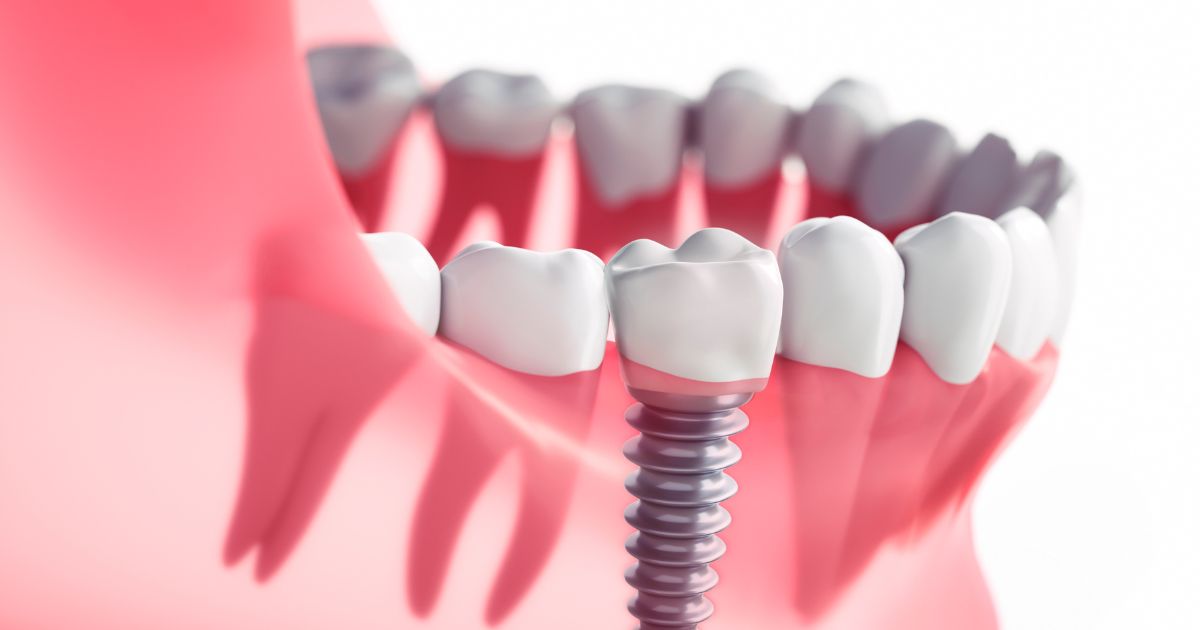With the appearance and same maintenance of natural teeth, dental implants are an excellent option for patients requiring tooth replacement. Approximately 120 million people in the United States are missing at least one of their teeth, and roughly 36 million have no natural teeth at all, according to the American College of Prosthodontists.
Dental implants are designed to be permanent, though their longevity depends on several factors. Dental implants are made up of different parts: the implant itself, which is embedded in the jawbone and serves as an artificial root, and the crown, the prosthetic tooth secured to the implant base.
Once placed, the implant material fuses with the surrounding jawbone tissue, making implant portion sturdy and permanent in most cases. The crown, however, may not be long-lasting, depending on the patient’s oral hygiene following placement.
What Causes Dental Implants to Fail?
Dental implant technology and materials have advanced significantly over the past two decades and can last a lifetime for most patients. Dental implant failure, however, can happen for several factors, including:
- Oral hygiene: Maintaining good oral hygiene is one of the biggest factors to maintaining dental implants, and bad oral hygiene can cause them to fail. Brushing your teeth two to three times daily, regular flossing, and dental check-ups are essential to successful and long-lasting implants.
- Bone density: In order to fuse with existing bone and form a solid foundation for your implants, good bone density is necessary. The density of bones decreases as you age. If you do not have sufficient bone density, you may be recommended for mini-implants instead.
- Pre-existing medical conditions: Several pre-existing medical conditions may negatively affect dental implants and lead to failure, such as:
- Diabetes.
- High blood pressure.
- Osteoporosis.
- Weakened immune system.
- Congestive heart failure.
- Atherosclerosis.
- Certain bleeding disorders.
- Food and chewing habits: As with natural teeth, hard, sugary, or sticky foods and hard chewing can negatively affect the implants and crown over time and must be avoided altogether for the first few weeks after implementation.
- Smoking and drinking: Excessive alcohol consumption and regular tobacco use often lead to dental implant failure and potential cancers. Limiting alcohol and discontinuing use of tobacco products is recommended for dental implant patients.
- Location: Where implants are located in your mouth affects the condition and longevity of dental implants, as people use their mouths and teeth in different ways. Implants in the back of the mouth are used more often and with greater pressure when chewing than implants in the front of the mouth.
- Teeth grinding: Patients who grind their teeth, particularly when sleeping, can cause the implants to fracture from the grinding motions, pressure, and trauma that cause the implant to move.
- Medications and treatments: Some medications and treatments for certain health conditions can affect the success of dental implants, such as immunosuppressive and blood-thinning medications or chemotherapy and radiation therapies.
- Age: Dental implant failure is higher in older patients, typically due to underlying medical or bone density conditions and slower healing following the procedure.
Successful implantation also depends on the oral surgeon’s skills. The lifespan of poorly placed or fitted implants is much shorter than those implanted with precision care and skill.
Symptoms of dental implant failure include implant moving, pain, redness, swelling, bleeding, receding gums, infection, and pus. You should see your oral surgeon right away if you are experiencing any of these symptoms.
South Jersey Oral Surgeons at Lanzi Burke Oral & Maxillofacial Surgeons Provide Dental Implants for Patients With Missing or Broken Teeth
If you are interested in exploring your options for missing teeth, one of our experienced South Jersey oral surgeons at Lanzi Burke Oral & Maxillofacial Surgeons can help you determine if you are a candidate for dental implants. Call us at 856-582-4222 or contact us online to schedule a consultation. Located in Washington Township, Haddonfield, and Woolwich Township, New Jersey, we are dedicated to helping patients throughout South Jersey.


